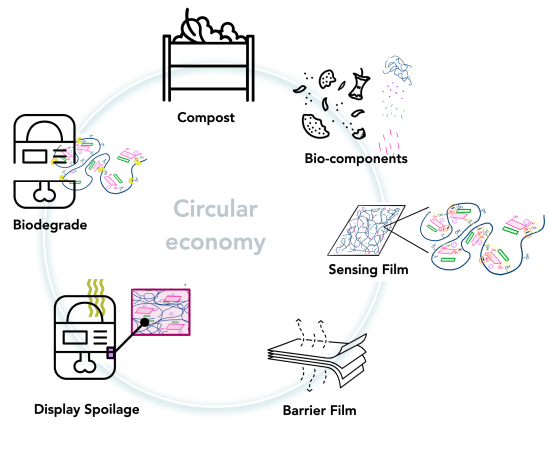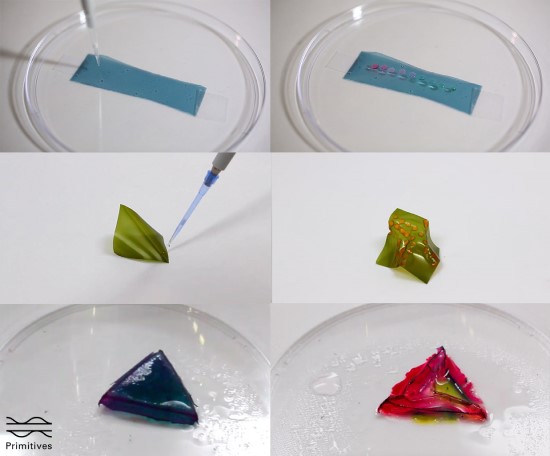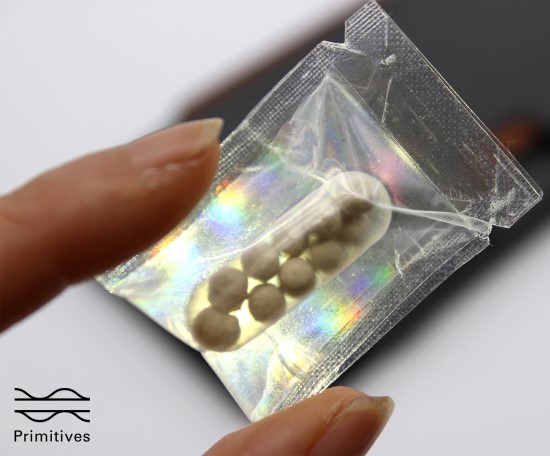Perceiving climate conditions
An estimated 125 to 160 bn pounds of food go to waste in the US alone every year, even though much of it is actually still in perfectly edible and nutritious conditions. Food waste causes one of the biggest carbon footprints worldwide. And think about the packaging all this wasted food comes in? You have seen the pictures plastic garbage bobbing in the waves of rivers and oceans, right? The early stage US startup Primitives Biodesign is aiming to tackle these challenges in a new biotechnological approach to avoid food waste and replace plastic on a holistic scale. It was founded by an all-female team of bio designers, scientists, and engineers, amongst whom also Viirj Kan, founder and CEO at Primitives. Viirj studied industrial design and media arts, and then became an MIT researcher in the field of human computer interaction, when she started wondering about why people do not critically respond to climate change. She figured that it might be a lack of tangible, visceral information on the direct effects of our deteriorating ecosystem on people that may be the cause of this problem. To raise awareness, she created a media art piece consisting of a transparent umbrella that “bled” in the presence of acid rain to make consumers grasp the fact that the sky can hurt everything beneath it. This principle then became the seed for Viirj and her team to develop the Primitives technology which aimed to enable people to actually detect the direct effects of their environment and climate change through their senses, by using biomaterials. Five years after the umbrella art piece, Primitives has successfully transformed their technology from academic lab into a commercial startup.
Benign by Biodesign
Primitives Biodesign started to explore how objects can be engineered to “come to life”, and communicate information on their status, and degrade after their use. The term “Primitives” that inspired the startup’s name, is a concept that originates from three disciplines: information technology, computer graphics, and the arts. In these domains, primitives represent geometric building blocks. With their biotechnological solutions, Primitives Biodesign is expanding this concept to the realm of materials, to create perceptual building blocks with materials that can change color, odor, texture, and mass.Primitives’ first intelligent bio polymer materials were based on feedstocks, such as algae and chitin that are integrated with sensing components that are encapsulated into bio polymer matrices to produce the desired sensing and communicating mechanisms. Primitives’ engineered materials are able to modulate odour intensity, change texture and colour, based on distinct climatic conditions. Beyond this, Primitives Biodesign also explored each of these information domains in depth, looking into examining colour spectrums, rates of change, saturation, and human perception. Practical applications include the production of completely compostable bio packaging solutions with integrated sensor labels that communicate exposure to unfavourable climate conditions. To name only but a few examples: Imagine knowing that a dose of insulin is no longer safe to use by only looking at a smart label that measures exposition to excess temperature? Or knowing that the milk is spoiled without having to smell or taste it? And Primitive’s bio polymer food wrap film safely detects and displays food spoilage and includes an oxygen barrier that, according to Primitives, actually outperforms petroleum-based PE and bio based PLA films, enabling food to be fresher for longer.
Next up at Primitives
With their stimuli responsive materials integrated into biopolymer packaging, Primitives Biodesign is offering outstanding solutions to tackle food and plastic wastes that are scalable, economically viable and easily integratable into existing manufacturing equipment. Together with a network of scientists, non-profits, and environmental advocacy organizations, the seed stage start-up Primitives Biodesign is further conducting research and partnering with stakeholders throughout the entire material-product lifecycle to create holistic strategies to tackle the multi-faceted problems of climate change. Primitives Biodesign Primitives Biodesign is actively contributing to the SDGs 12, responsible consumption and production, and SDG 14, life below water. They joined the ISC3 GSS in 2020 and won the Day 2 ISC3 Investor Forum Audience Award for best pitch in the frame of the ISC3 Investor Forum 2020.




